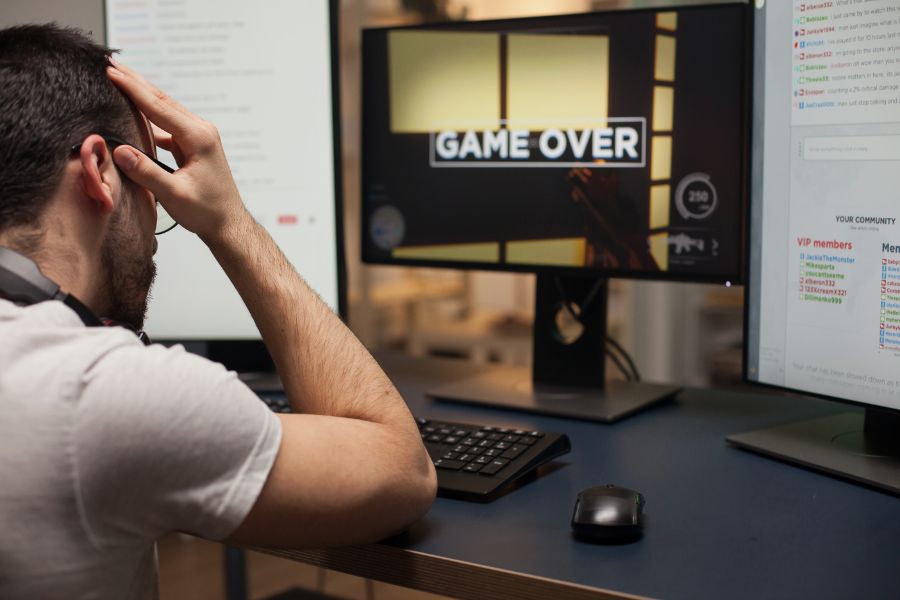Did you know that 65% of American households play video games regularly?
While gaming can be a source of entertainment and relaxation, it’s important to consider the potential negative impacts they may have on individuals and society as a whole.
From health risks to social isolation and academic struggles, the effects of excessive gaming are far-reaching.
Before dismissing the idea of banning video games outright, it’s essential to explore the reasons behind these concerns and evaluate the long-term consequences they might pose.
Key Takeaways
- Excessive gaming poses serious health risks like anxiety, depression, and obesity.
- Video games hinder youth development by impeding social skills and cognitive growth.
- Gaming addiction leads to social isolation, aggression, and academic performance issues.
- Lack of regulations and parental controls in gaming industry risks minors’ exposure to harmful content.
Health Risks Associated With Gaming
Excessive gaming has been empirically linked to a range of health risks, including increased anxiety, depression, and physical ailments such as carpal tunnel syndrome and obesity. Mental health can suffer due to the sedentary nature of gaming, leading to feelings of isolation and heightened stress levels.
Physical well-being is also at stake, as prolonged gaming sessions can result in issues like obesity, back and neck problems, eye strain, and disrupted sleep patterns. The lack of physical activity further exacerbates these concerns, creating a cycle of health problems.
It’s crucial to recognize the impact of excessive gaming on both mental and physical health, urging individuals to strike a balance between gaming and engaging in activities that promote overall well-being.
Impact on Youth Development
Video game usage among youth has been observed to hinder the development of social skills and real-life interactions. Excessive gaming can impede cognitive development by reducing time spent on activities that promote critical thinking and problem-solving skills.
Additionally, prolonged exposure to video games may compromise emotional intelligence as it limits face-to-face interactions essential for understanding and managing emotions effectively. Academic performance can suffer due to the prioritization of gaming over studying, impacting overall educational growth.
Video game addiction in young individuals can lead to increased aggression, depression, and isolation, further hampering their social and emotional well-being. It’s crucial for youth to engage in a balanced array of activities that foster cognitive development and emotional intelligence to ensure holistic growth.
Social and Behavioral Concerns
The impact of heavy gaming on individuals’ social interactions and behavior raises significant concerns regarding their overall well-being and development. Excessive gaming can lead to decreased real-life social interactions, potentially contributing to social isolation. Online gaming exposes individuals to cyberbullying and toxic behavior, negatively impacting their mental well-being.
Those heavily involved in gaming may struggle to form genuine relationships and develop essential social skills. Moreover, gaming addiction can result in increased aggression and irritability, further complicating social interactions. These psychological effects can have lasting consequences on individuals, affecting their ability to navigate real-world relationships and function effectively in society.
It’s crucial to address these social and behavioral concerns associated with excessive gaming to promote healthier lifestyles and well-rounded development.
Influence on Academic Performance
Gaming habits have been found to have a significant impact on students’ academic performance, with detrimental effects observed in various aspects of their educational journey. Excessive gaming is associated with reduced study hours, poor concentration, and lower academic performance. Students addicted to gaming often prioritize playing over studying, leading to missed deadlines and a lack of motivation for educational pursuits.
This imbalance in time management can hinder cognitive skills development crucial for academic success. Gaming addiction can result in lower grades, distractions from gaming, and struggles with focusing on studies, all of which negatively impact academic progress. Heavy gamers may find it challenging to excel academically due to the detrimental effects of excessive gaming on their ability to concentrate and engage effectively in their studies.
Legal and Regulatory Perspectives
Considering the potential risks associated with inadequate enforcement of age restrictions and lack of parental controls, the need for stricter regulations in the gaming industry becomes increasingly evident. Government oversight plays a crucial role in ensuring that age restrictions on violent and explicit games are effectively enforced to protect minors from inappropriate content.
Simultaneously, industry responsibility is paramount in implementing robust parental controls to limit children’s exposure to harmful material. Educational campaigns can further inform parents about the risks of excessive gaming, while collaboration with schools can promote balanced technology use among students.
Stricter regulations are necessary to safeguard consumers, particularly minors, from potential harm and ensure a safer gaming environment for all.
Conclusion
In conclusion, the negative impact of video games on health, social behavior, and academic performance can’t be ignored.
It’s essential to consider implementing regulatory measures and educating individuals about the risks associated with excessive gaming.
By addressing these concerns, we can better protect individuals from the harmful effects of gaming addiction and promote a healthier and more balanced lifestyle.
Read More:






Leave A Comment